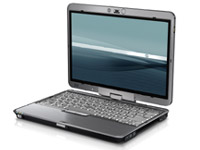HP ultra-cautious on ultra-mobiles

Despite its strong presence in the tablet and PDA marketplace, Hewlett-Packard questions whether Intel's ultra-mobile devices can hit the "mobility sweet spot" and says tablets have failed to live up to the hype.
Speaking to ZDNet Australia at HP's 2007 Mobility Summit in Shanghai, the company's most senior notebook executive said that HP would not rush to embrace the new Ultra Mobile platform which Intel unveiled last month.
These devices range in screen size from seven inches down to four inches and will run either Windows or Linux, although it's the larger models which are intended for business users and mobile professionals.
"It's interesting to us, and we're investigating that space, but a (HP ultra-mobile) device would have to meet the right performance, mobility and price vectors, and that's proven to be very difficult," said Ted Clark, general manager for HP's Notebook Global Business Unit.
"If you remove one of those -- if you just worry about mobility and performance but not price, for example -- we could probably do a device very well. But all three of those vectors?
The value for the customer, in terms of what you get versus what you have to pay for that combination, is not there. There could be something there in the long term, but that could be one or two or three years from now."
HP is certainly more upbeat about the broader prospects for the business notebook market, unveiling seven new models at its annual mobility summit. These will be rolled out onto the Australian market from next week through to late July.

HP's Compaq 2710p -- an ultra-thin tablet model.
The company has also addressed its admittedly confusing mix of product names and model numbers by streamlining their business portfolio into three core groupings. Ultra-Light notebooks will carry a model number in the 2000 range, Balanced Mobility offerings are branded in the 6000s, while High Performance portables fall into the 8000 series.
Individual sets of features tailored to specific usage models will be packaged into four variations with matching suffixes: standard (s), business (b), professional (p) and workstation (w).
However, HP has also chosen not to make Intel's new Centrino Pro a standard inclusion on their business notebooks. It's a move which will put HP at odds with manufacturers such as Toshiba, who have committed to a fully Centrino Pro business line by mid-year.
Instead, HP will offer Centrino Pro "as an upgrade item on any enterprise notebook," Clark said. "It's about giving the customers a choice."
An HP spokesman later told to ZDNet Australia that the cost to the end-user of building Centrino Pro into a notebook was "around US$20, and if you're not going to use it then it's certainly not worth paying for."
HP's new business line includes an ultra-thin convertible tablet model, the Compaq 2710p, with optional optical drive and extended battery modules rated for 10 hours.
While HP was the first to support Microsoft's tablet PC initiative and is now into its fifth generation of tablets, Clark told ZDNet Australia that the overall market for tablets had failed to live up to everyone's hopes.
"The products that we have done have met expectations, but in terms of where the market could be, I'd say it has not met our expectations. Five years ago there was some belief that by this time tablet (technology) would be offered on every notebook, like a bigger hard drive or more memory. But that's clearly not the case."
However, Clark believes that Vista will help the uptake of tablets in the enterprise space. "Tablet functionality has certainly improved in Vista, and one of the big things for corporate customers is that tablet is no longer two images to manage, and that's a big deal. In XP the Tablet edition was always a second drive image and that was something that IT departments certainly did not like."
David Flynn travelled to the HP Mobility Summit in Shanghai as a guest of HP.